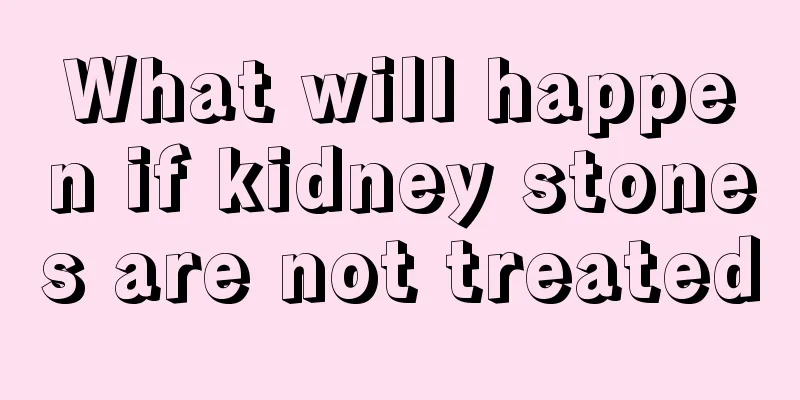What will happen if kidney stones are not treated

|
Patients with kidney stones certainly cannot ignore treatment, because not paying attention to treatment may lead to more adverse consequences, such as obstruction or urinary tract accumulation, or hematuria and symptoms such as low back pain and abdominal pain. 1. When kidney stones fall into the narrow part of the ureter, it can cause partial or complete blockage, leading to water accumulation in the urinary tract and even dilation of the renal pelvis, and cause symptoms such as pain, difficulty urinating, sudden interruption of urination, and urinary retention. 2. Hematuria often occurs after various physical activities. Hematuria can be divided into macroscopic hematuria, which means the red urine can be observed with the naked eye; and microscopic hematuria, which means the color change cannot be seen with the naked eye and the red blood cells in the urine can only be observed through a microscope. Therefore, when gout patients have a urine test and find a large number of red blood cells under the microscope, they should check for the presence of stones. In order to prevent kidney stones from becoming more serious, you can first use Depuchang's Shishi Tea to expel them. 3. About half of patients with long-term kidney stones will experience lower back and abdominal pain. In mild cases, there are symptoms such as dull pain, bloating, and dull pain; in severe cases, there are severe paroxysmal intermittent colic, some of which are like knife-like pain, mostly accompanied by radiation to the ipsilateral groin and perineum. A small number of patients also have reflex pain on the healthy side, which is lighter than the pain on the affected side. When the pain is severe, the patient often groans incessantly, tosses and turns restlessly, feels nauseous and vomits, becomes pale, sweats profusely, has a low blood pressure, and is in a state of collapse or shock. For a few patients, the pain can be relieved by itself after a few hours, but for most people, antispasmodics and analgesics are needed to stop the pain. If the stone falls into the bladder, in addition to pain, there will also be stone irritation symptoms such as urgency and frequency of urination. 4. If kidney stones cause hydronephrosis for too long, urination is blocked, and the area above the obstruction is under excessive pressure, kidney blood flow is reduced, renal tubular degeneration and necrosis may occur, and the kidneys may atrophy and shrink, resulting in decreased renal function or complete failure. 5. Urinary tract infection often occurs in patients with combined stones or secondary infections after stone surgery. It is most common in urethra and bladder inflammation, but can also occur in the renal pelvis and around the kidneys. |
<<: What kind of tea is jasmine tea
>>: Will kidney stones cause hematuria symptoms?
Recommend
What to do if the sweater shrinks
Wool sweaters are a common type of clothing. They...
Can hyperthyroidism be cured
55 Can hyperthyroidism be cured? Hyperthyroidism ...
What to do if the upper teeth are skeletally protruding and the chin is retracted
Everyone wants their facial features to become th...
Are there any folk remedies that can treat lung cancer? You can try these effective folk remedies to treat lung cancer
Clinically, chemotherapy is the most commonly use...
What symptoms will appear if you have lung cancer? 4 symptoms, be careful of lung cancer
Everyone knows that lung cancer is a very terribl...
What are the common malignant tumors? How can B-ultrasound diagnosis of liver cancer be confirmed?
What are the common malignant tumors? Carcinoembr...
What are the methods of using pearl powder to remove blackheads?
There are many ways to remove blackheads, but why...
The difference between acupuncture and moxibustion
Acupuncture and moxibustion are both treasures of...
My feet are allergic and they are red, swollen and itchy. What's going on?
People should be familiar with allergies, because...
How to fart quickly when you have a bloated stomach
Bloating is a common problem for everyone, especi...
Will you get fat if you eat breakfast and then go to bed?
As more and more people are getting fat, many peo...
What tests should patients with nasopharyngeal carcinoma undergo before treatment?
The incidence of nasopharyngeal carcinoma has bee...
What are the symptoms of thalassemia minor?
In life, we all know that thalassemia is a heredi...
What kind of shoes should I wear when dancing?
Dancing is a sport that many people like. It can ...
What are the common symptoms of blocked tendons and veins?
Blockage of tendons and meridians is an extremely...









